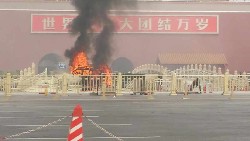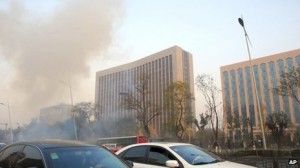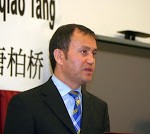
A vehicle in flames after crashing into crowd of tourists at Tiananmen Square in Beijing, China.
Photo: @mranti, Twitter/ news.nationalpost.com
Three people drove a Mercedes SUV into a crowd in Tiananmen Square, the political centre of the capital Beijing, where it caught fire, killing themselves and two tourists. Thirty eight bystanders were also injured in the blast which took place on October 28. It was initially considered to be an accident, but the Chinese authorities say the vehicle was loaded with 400 litres of gasoline, and knives, and are treating it as a suicide attack which was planned in advance.
Immediately after the incident, the area was sealed off, foreign journalists were prevented from visiting the site and images were removed from their cameras. Chinese social networking sites were bombarded with posts reporting the fire but these were quickly deleted.
The Chinese authorities are blaming the attack on the Uyghurs from the restive Muslim-dominated Xinjiang region in China’s far north-west, and have detained five suspects, all Uyghurs.
China’s domestic security chief, Meng Jianzhu, said the attack was carried out by activists from the East Turkestan Islamic Movement, which the Chinese authorities describe as a Muslim Uyghur separatist group with links to al-Qaeda. Little is known about the group which is listed as a terrorist organisation by the UN, US, and others. East Turkestan is the local Uyghur name for Xinjiang.
Xinjiang has seen repeated outbreaks of violence. Beijing argues that it has invested heavily in the region, and says that Uyghurs are guaranteed wide-ranging religious and cultural freedoms. However, the Uyghur Muslim community has grown increasingly frustrated at controls on their religion and culture and an influx of Han Chinese migrants, which they say has left them economically marginalised. Some seek autonomy, and reports coming in from the region tell of a crackdown on the Uighur community
The World Uyghur Congress has said that Chinese police have arrested at least 53 people in Xinjiang since the blast in Beijing and that “a period of unprecedented repression” appears imminent. The Congress has appealed for support from the international community, fearing that Beijing will use the Tiananmen incident to justify further repression of the Uyghur community.
Alim Seytoff, spokesperson for the World Uyghur Congress, said: “Uighur people are, just like the Tibetans, fed up with the Chinese government’s brutal rule in their homeland. Therefore some people unfortunately take matters into their own hands out of desperation and decide to express their resistance to Chinese rule by violent means.”

A series of small blasts outside Communist party offices in the Chinese city of Taiyuan, Shanxi killed one person
Photo: AP
Just days after the Tiananmen Square incident, reports were received of multiple blasts outside Communist party offices in the northern Chinese city of Taiyuan, Shanxi with one person killed and eight injured. These two fatal incidents happened a few days before a major Communist Party meeting to discuss reforms.





 Print
Print Email
Email